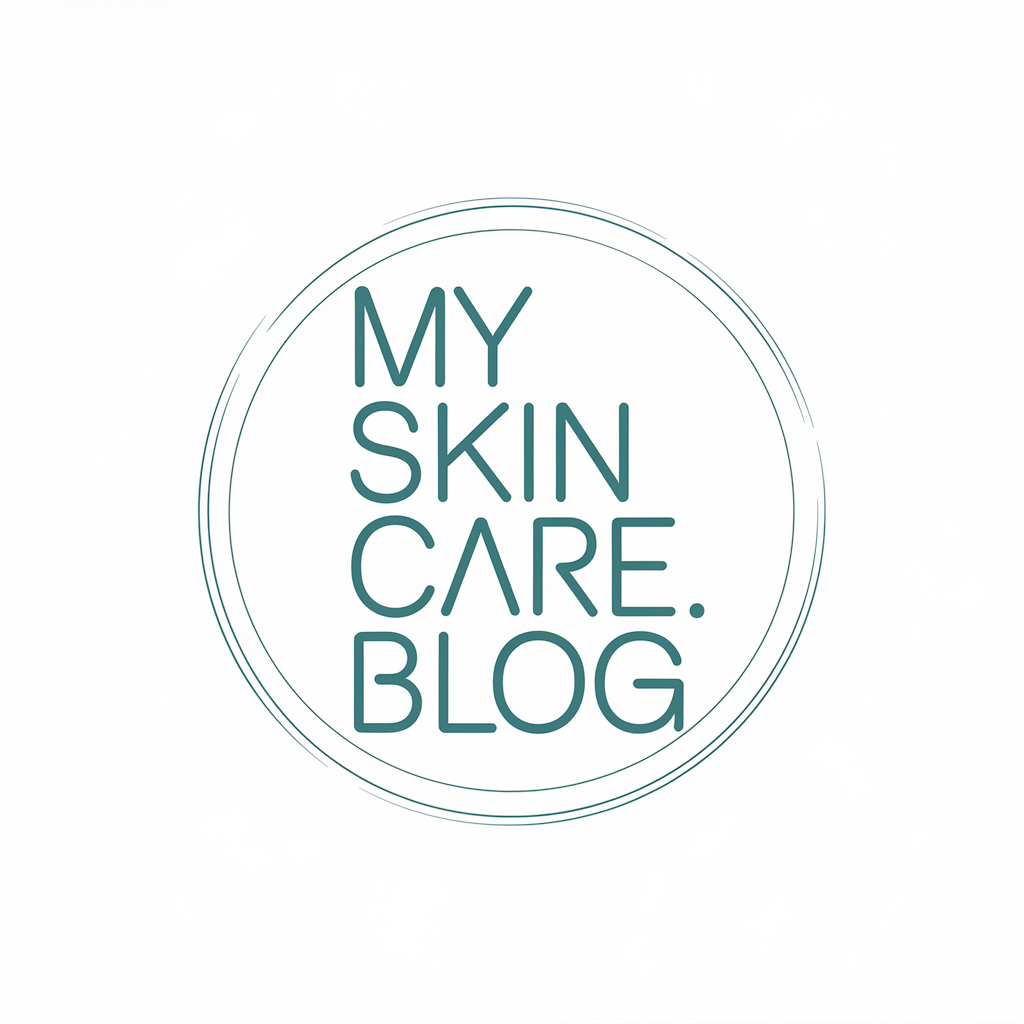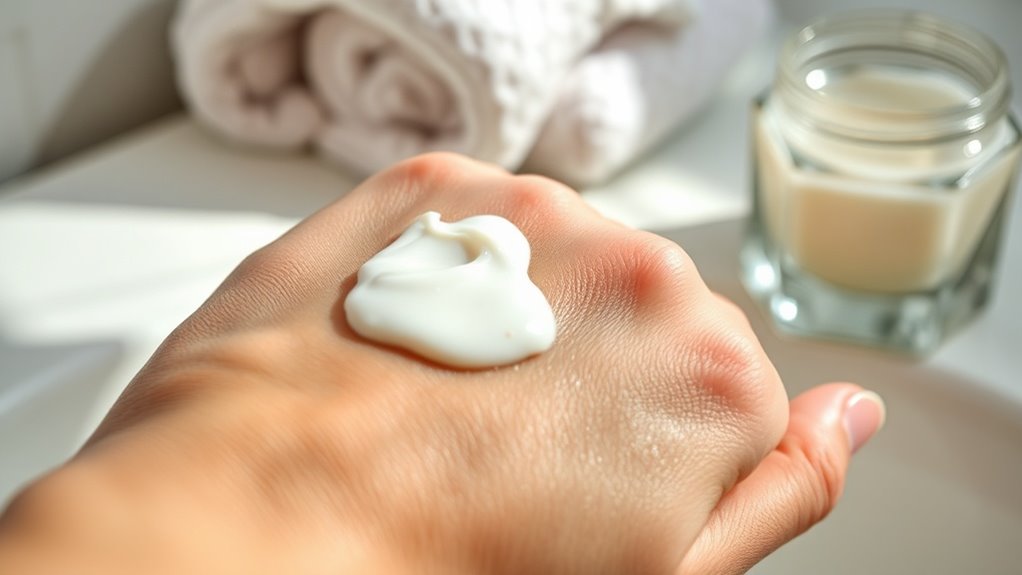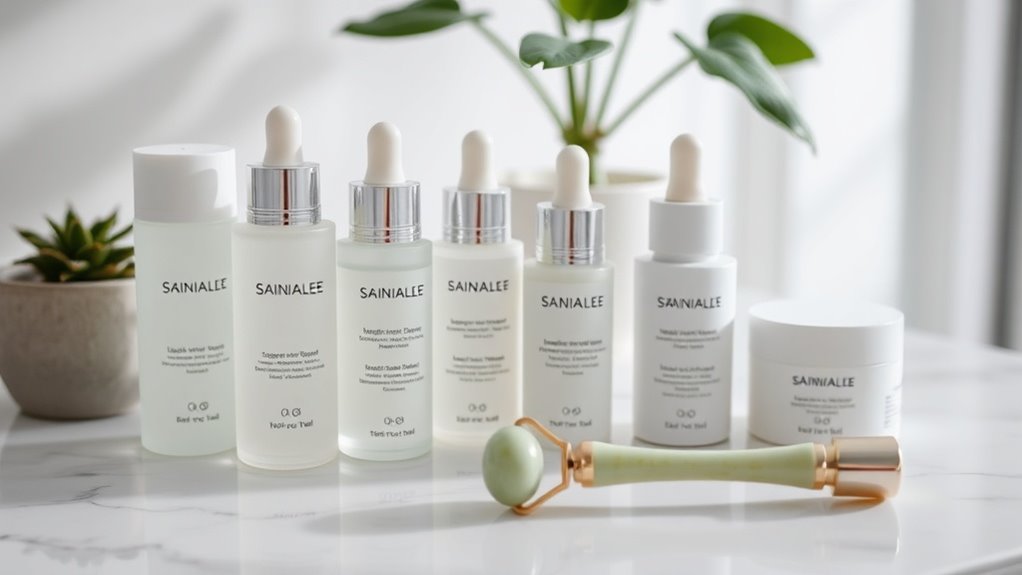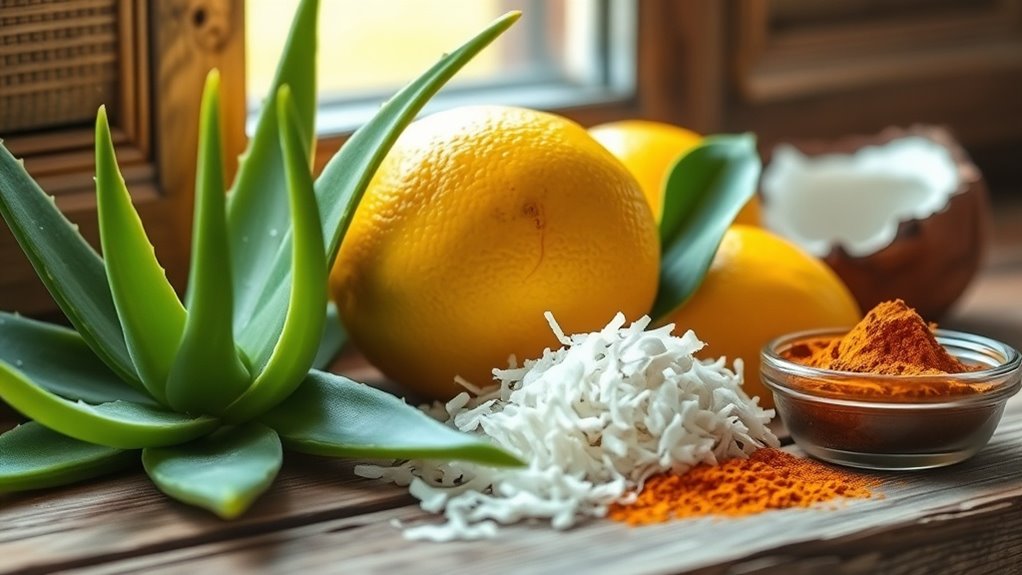Acne Scars Fading Slowly. Speed It Up With This Routine
You’re frustrated that your acne scars are fading slowly, but you can speed it up with this evidence-based routine. Gently cleanse twice daily with a pH-balanced wash, then apply key ingredients like vitamin C and niacinamide to boost collagen and reduce marks. Exfoliate with AHAs a few times weekly, moisturize using hyaluronic acid, and protect with SPF 30 sunscreen daily. Incorporate omega-3 foods and track progress for quicker results—uncover more strategies to refine your approach.
Key Takeaways
- Use niacinamide and hyaluronic acid daily to reduce inflammation and hydrate skin, speeding scar fading.
- Exfoliate 2-3 times weekly with AHAs or BHAs to remove dead skin and promote renewal.
- Apply a non-comedogenic moisturizer twice daily to maintain skin barrier and enhance healing.
- Wear broad-spectrum SPF 30 sunscreen every day to prevent scars from darkening under sun exposure.
- Incorporate vitamin C-rich foods and hydration into your diet to boost collagen and support skin repair.
Types of Acne Scars
Acne scars come in distinct types that affect your skin differently. While treating active acne promptly can help prevent these scars, incorporating overnight treatments based on dermatologist recommendations may aid in early intervention.
Atrophic scars, the most common, include ice pick scars—deep, narrow pits that puncture your dermis—or boxcar scars, forming broad, boxy depressions.
Rolling scars create a wavy, undulating texture across your skin.
In contrast, hypertrophic scars are raised lumps from excess collagen buildup, while keloids extend beyond the original site.
Dermatological evidence shows these types stem from varying healing responses to acne.
You assess your scars by examining depth, texture, and elevation, guiding precise management to minimize their visibility and impact.
To enhance scar fading, explore natural remedies that can complement professional treatments for better outcomes.
Essential Skincare Ingredients
To fade your acne scars effectively, you must incorporate key scar ingredients like vitamin C and niacinamide into your routine for their proven collagen-boosting effects.
Effective healing compounds, such as hyaluronic acid, help repair skin barriers and reduce inflammation based on dermatological research.
Start selecting products with these essentials to optimize your daily regimen and achieve visible results.
Additionally, vitamin C plays a key role in addressing hyperpigmentation to promote an even skin tone.
For a natural approach to tackling hyperpigmentation, consider incorporating DIY solutions from effective home remedies into your routine.
Key Scar Ingredients
Fading acne scars demands proven ingredients that actively repair skin, such as vitamin C, which brightens and protects against damage, and retinoids, which stimulate collagen to smooth texture.
You can speed up healing by choosing products with these evidence-backed options, tailored to your skin type for optimal results.
-
Vitamin C: Boosts collagen production and reduces pigmentation for even tone.
-
Retinoids: Accelerate cell turnover to minimize scar depth effectively.
-
Niacinamide: Strengthens the skin barrier and fades post-inflammatory marks.
-
Hyaluronic Acid: Hydrates deeply to plump and smooth scarred areas.
-
Alpha Hydroxy Acids: Exfoliate gently to reveal fresher, less indented skin.
Effective Healing Compounds
While vitamin C and retinoids tackle scar repair, you’ll find that other healing compounds speed up skin recovery by strengthening barriers and boosting elasticity.
Niacinamide fortifies your skin’s barrier, reducing inflammation and hyperpigmentation, as studies show it improves texture in weeks.
Hyaluronic acid delivers deep hydration, enhancing elasticity and plumpness for resilient skin.
Peptides stimulate collagen synthesis, fading scars faster, backed by clinical evidence.
Incorporate them practically: apply niacinamide serum daily, follow with hyaluronic acid, and use peptides at night to optimize healing and prevent damage.
Daily Cleansing Methods
To effectively fade acne scars, you must prioritize daily cleansing methods that keep your skin clean without causing irritation.
Start with a gentle face wash to remove excess oil and debris, then integrate exfoliation techniques to slough off dead cells.
These evidence-based tips, when added to your routine, help prevent new breakouts and promote smoother skin texture.
It’s crucial to avoid over-cleansing, as it can damage the skin barrier.
Additionally, be mindful of water temperature to avoid irritating your skin.
Gentle Face Wash
A gentle face wash forms the foundation of your daily cleansing routine, especially when tackling acne scars. It removes excess oil and impurities without stripping your skin’s natural barrier, reducing inflammation and supporting healing, as evidenced by dermatological studies showing improved scar outcomes with mild cleansers.
-
Choose a non-comedogenic, pH-balanced formula to prevent irritation.
-
Use lukewarm water and cleanse for 30-60 seconds twice daily.
-
Opt for ingredients like glycerin for hydration and soothing effects.
-
Avoid alcohol-based products that can dry and sensitize skin.
-
Pat dry gently to maintain moisture and promote recovery.
Exfoliation Techniques
Exfoliation boosts your acne scars fading routine by sloughing off dead skin cells and promoting faster cell renewal, which dermatological research links to better scar reduction.
You’ll benefit from chemical exfoliants like salicylic or glycolic acid, which dissolve dead skin without abrasion, as clinical trials show improved texture.
For physical techniques, opt for a soft brush or enzyme-based cleanser daily, but limit to every other day if your skin is sensitive.
Always choose products with proven efficacy, apply gently, and monitor for irritation to optimize results without compromising your skin’s health.
Daily Routine Tips
Building on your exfoliation efforts, incorporate daily cleansing as the foundation of your acne scars routine. Effective cleansing removes excess oil, dead skin, and bacteria, reducing inflammation and promoting healing, as supported by dermatological studies.
-
Choose a gentle, non-comedogenic cleanser*: Opt for formulas with *salicylic acid to unclog pores without irritation.
-
Cleans twice daily****: Wash your face in the morning and evening to maintain balance and prevent buildup.
-
Use lukewarm water****: This prevents stripping natural oils, keeping your skin barrier intact.
-
Massage gently: Apply with fingertips in circular motions for 30 seconds to enhance circulation.
-
Pat dry and moisturize: Avoid rubbing to minimize trauma, then seal with a lightweight moisturizer for hydration.
Exfoliation Strategies
When you’re tackling acne scars, incorporating targeted exfoliation strategies can accelerate healing by sloughing off dead skin cells and stimulating regeneration. Choose evidence-based methods like AHAs or BHAs, as studies show they enhance collagen production without excessive irritation. Always patch-test and limit frequency to prevent sensitivity. Additionally, following proper techniques for different skin types can help minimize risks and promote healthier outcomes.
For enhanced results, especially with oily skin, consider salicylic acid to effectively unclog pores and reduce acne-related scarring.
| Exfoliation Method | Benefits and Tips |
|---|---|
| AHAs (e.g., Glycolic Acid) | Gently resurfaces; use 2-3 times weekly on clean skin. |
| BHAs (e.g., Salicylic Acid) | Unclogs pores; ideal for oily types; apply nightly. |
| Enzymes (e.g., Papaya) | Natural enzyme action; mask once a week for mild exfoliation. |
| Microdermabrasion | Stimulates renewal; professional or at-home kits, monthly. |
| Retinoids | Boosts cell turnover; dermatologist-recommended, start low. |
This approach, backed by dermatological research, speeds fading effectively.
Moisturizing Techniques
While exfoliation clears away dead skin, moisturizing plays a vital role in restoring your skin’s barrier and accelerating acne scar fading.
It’s essential for maintaining hydration, which supports cell repair and minimizes inflammation. To optimize your routine, follow these evidence-based techniques:
-
Select a non-comedogenic moisturizer**** with ceramides or hyaluronic acid to lock in moisture without clogging pores.
-
Apply twice daily after cleansing and exfoliating for maximum absorption.
-
Use a pea-sized amount**** on your face, gently patting it in for even coverage.
-
Focus on dry areas first to target scar-prone spots effectively.
-
Reassess weekly to ensure it’s improving texture and fading.
Moreover, for a natural enhancement, you can try creating a chemical-free moisturizer using simple household ingredients.
Moreover, hyaluronic acid is considered the most effective moisturizing ingredient, providing instant hydration to accelerate the fading of acne scars.
Sun Protection Measures
Protecting your skin from UV rays daily is essential for preventing acne scars from darkening and slowing their fade. Evidence from dermatological research shows UV exposure increases melanin production in scars, making them more visible and persistent.
Apply a broad-spectrum sunscreen with at least SPF 30 every morning, covering all exposed areas, and reapply every two hours outdoors or after sweating. Wear protective clothing like wide-brimmed hats, UV-blocking sunglasses, and long sleeves to shield your skin. When selecting your sunscreen, note that SPF 50 provides greater protection by blocking a higher percentage of UVB rays compared to SPF 30.
Seek shade during peak sun hours (10 a.m. to 4 p.m.) to minimize damage. These practical steps accelerate healing by reducing inflammation and promoting even skin tone. Furthermore, daily sunscreen application is the most essential and cost-effective anti-aging measure, helping to prevent premature aging while supporting scar fading.
Dietary and Lifestyle Tips
Adopting a nutrient-rich diet and healthy habits accelerates acne scar fading by reducing inflammation and supporting skin repair.
You’ll boost healing by focusing on foods and routines backed by research, like antioxidants that combat oxidative stress.
-
Load up on vitamin C-rich foods, such as citrus and berries, to enhance collagen production.
-
Prioritize omega-3 sources like salmon to reduce inflammation effectively.
-
Drink at least 8 glasses of water daily to maintain skin hydration and toxin removal.
-
Engage in regular exercise, like 30 minutes of walking, to improve blood flow and skin health.
-
Ensure 7-9 hours of sleep nightly for optimal cellular repair and recovery.
Progress Monitoring Tools
Tracking your acne scar progress builds on the dietary and lifestyle habits you’ve adopted, ensuring you see real improvements over time. Use evidence-based tools like progress photos and journals to measure changes objectively, as research confirms this enhances adherence and results.
| Tool | Benefits |
|---|---|
| Progress Photos | Visually tracks fading over weeks |
| Skin Journals | Logs texture, color, and triggers |
| Mobile Apps (e.g., trackers) | Analyzes trends with reminders |
| Professional Consults | Provides expert assessments quarterly |
This routine keeps you accountable, accelerating your path to clearer skin—stay consistent for optimal outcomes. (99 words)





